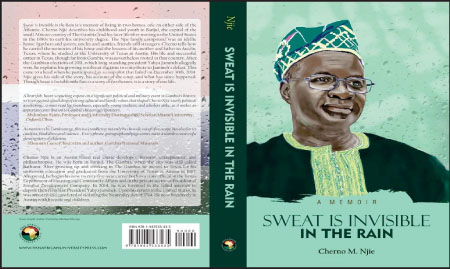
Reviewed
by Professor Toyin Falola
The
book, Sweat is Invisible in the Rain, written by Cherno M. Njie and published
by the Pan-African University Press, is better classified as a documentation of
three interconnected stages of the author’s life, career, vision, and ambition.
Such is the importance of the book that a major conference is being convened on
it in Gambia on December 14th, 2019. I am glad to be associated with the book,
proud to occupy a line or two in the contents, and humbled to be associated
with the author.
The
book successfully privileges the historical and the factual over the literary.
It deals with causation using a wide range of facts, explaining why events and
actions occurred at particular moments in time. The principal figures and
protagonists are revealed in ways that reflect their time, age and day. Sweat
is Invisible in the Rain will surely asserts itself as a book to read and be
reckoned with, as it captures the commonalities of personal experiences in The
Gambia, the shortcomings of the country’s political elite, the intriguing
nature of dictatorship, and a wide range of dialogue on the degeneracy of
political institutions. The antipathy that the leadership of the country
aroused is captured with brilliance, as well as the responses to how to deal
with unpopular power. I admire Njie’s voice and courage as he narrates the
sickness of leadership, the weakness of followership, the limitations of state
power, and the repetitiveness of calamitous history.
The
book starts from Njie’s growing up in a relatively unknown and small African
country, The Gambia (the first stage), to his transition to perhaps one of the
most popular migrant destination countries in the globe, the United States of
America (the second stage). The third stage takes center stage of the events
captured in the book as it details how the two previous life’s stages induced
the author to embark on a series of moves that set in motion the process of
acting as a change agent. Consequently, his first stage of existence during his
childhood in The Gambia keys into the immense benefits that he experienced in
his second stage of existence, The United States of America.
The
title of the book aptly encapsulates all that the author went through, which
were not noticeable when they were occurring, but which cannot be swept under
the carpet simply because of their non-noticeability, disguise and secrecy.
Sweat is surely invisible in the rain, but the laborer who worked hard in the
rain knows that the rain just served as a camouflage to hide the sweat
generated from his labor. And when rain falls, it can create its own problems,
with the rain and sweat inducing unnoticeable pains and anguish.
Cherno
Njie is able to map out in detail his personal travails, albeit in consonance
with those of some others as they, over a period of more than a decade,
embarked on missions, as well as developing various strategies to achieve an
objective whose benefits are not personal in any way, but rather collective to
a large, unsuspecting and ignorant populace. The sweat of the author and ‘his
band of merry men’ might have gone invisible in the myriad of raindrops of
events that happened in The Gambia between 1996 and 2016. However, with the
expediency with which this book was written and the fact that the story was
told by someone who played a significant part in the many facets of the plot,
Njie succeeds in bringing to the fore, the invisible sweat that seems to have
been lost in the rain with respect to the journey to free an African people
from the reigns of tyranny.
Before
going into the chapter-by-chapter review, a glance at the acknowledgments given
in the book introduces the reader to the individuals who were instrumental in
the course of documenting the stories as well as the major players in the
events who took center stage in the book. All these are carefully outlined and
perfectly detailed within the confines of the acknowledgment page. The preface
introduces the reader to the central event of the book: the failed coup attempt
which involved the author and a handful of other patriots in the small West
African nation, The Gambia. As with any proper preface, it gives a brief account
of the reasons for the coup attempt as well as the aftermath of it, which saw
some of the perpetrators killed, some captured, while some fortunately escaped
but eventually made to pay for their actions on a foreign soil. The last set of
the most fortunate who did not die includes the author. An attempt is also made
in the following section to open the reader’s mind to the history of The
Gambia, an effective step to equip the reader with some historical antecedents
of the Gambian people concerning politics, governance, and leadership. This
section traces Gambian history to centuries back. Also, credit should be given
to the author for taking time to prepare the mind of the reader in advance to
similarities of persons’ names who may or may not be related, but which is just
a common occurrence among the Senegambian people. Without this, the reader
would have been a bit lost in the maze of seemingly related nomenclatures of
people who share no familial relationship.
The
first chapter, as the title implies, ‘Close Quarters: Growing Up in Banjul’,
details the city of Banjul where the author grew up, a careful comparison
between the Banjul of old times and the one left behind by the evident
antagonist of the book plot, Yahya Jammeh, the erstwhile dictator of The Gambia.
Njie affirms that nothing seems to have changed in the 22 years of Yahya
Jammeh’s rule, a common characteristic of most dictatorship governments in
Africa. So that both the African and non-African reader can immerse themselves
into the cultural settings of the first stage of the book’s plot, the author
does justice to highlighting the various family settings that is ubiquitous in
the capital of The Gambia; Christian homes having distinct attributes to Muslim
homes with respect to composition and way of living.
The
chapter also highlights the components of the Wolof caste system. Among the
experiences of growing up in African communal settings is the issue of
circumcision, which is also embedded in the book. Brought to the fore in this chapter is the disposition
of Africans to hold on perpetually to superstitious beliefs, including beliefs
in the existence of flesh-eating witches who are ultimately made to confess
their sins, casting of spells, laying spiritual curses and the manifestation of
evil spirits. For a book that details life in Africa, the absence of such a
subplot would have led to the absence of a very pertinent aspect of African
thought and mentality. Upholding some of these beliefs might be rational;
however, as the book notes, there are times when these beliefs place more
damage than good to the African people as became evident under the oppressive
rule of Jammeh who exploited these beliefs to the people’s detriment. These
beliefs, as the author notes, are in sharp contrast with the second stage of
the book’s plot setting, the USA, a nation that is built on the ideology of
secularism and scientific methods.
The
second chapter sets the tone for the author’s transition from a small unpopular
African nation to a massive and popular country far away in another continent,
deep into Texas in furtherance of his formal education, which, as pointed out,
was quite different in approach to what he was familiar with growing up in The
Gambia. Affirming the frenzy that envelopes Africans moving to the western
world for the first time, the book rightly captures the drama that goes with
leaving one’s family in Africa for greener pastures, education inclusive. This
practice has always been the norm for affluent families in Africa, as they held
the belief that better and qualitative education abroad is a sure way to wealth
and riches. This is not entirely a falsehood as later events in the book prove
this assertion to be right. Settling down in a new country is not always going
to be so easy, and the same was rightly captured by the author. True to the
assertions, it took little effort for the migrant to afford a car, something
that would have been close to impossible in an African student setting.
In
Chapter three, ‘The Jammeh Years: 1994 – 2016’, the story quickly moves to the
central plot of the book wherein Njie brings to the reader’s awareness the
introduction of the antagonist by telling the story of how Jammeh came to
power. As with every good book, it is always necessary to accord the antagonist
a grand entry into the plot, more so in a story that revolves around military
rulership, dictatorial tendencies and ultimately the subplot of military coups.
The author, within the context of the book, exposed the reader to the events
that necessitated the grand entrance of the major antagonist of the book,
Jammeh. Years of misrule by the first president of The Gambia, Dawda Jawara
(who passed away on August 27, 2019), served as an impetus for the emergence of
Jammeh as the new head of the Gambian government, even though he rose to the
exalted position illegitimately.
Another
theme of the book which looks hidden in the shadow of the overall military
theme is the propensity of powerful countries like the USA to follow up on the
various happenings around the globe with respect to governments and regime
change. The USA has been known as a nation that engages in intelligence
gathering in virtually all countries in the world, and this makes the US
government a prospective conspirator to acts that leads to political instability
in other relatively smaller and weaker nations.
The
plots in the book are interwoven, and they do not follow a definite order, as
it is necessary to weave the story in a manner that will enable the reader to
understand the expediency of events, actions and motivation that create a back
and forth sequence of storytelling. Sweat is Invisible in the Rain allows the
work to represent its author, and to speak to a tumultuous moment in the
history of The Gambia. The book offers the fullest story of Njie’s life, in
addition to a remarkable understanding of his mother country in both its
volatile and remarkable moments. This highly readable and valuable memoir is
one of the best to come out of West Africa. I admire his ability to tell the
story so well and clearly. I can only hope that the people of The Gambia will
get the justice they seek and deserve, and the progress that they dream about.
With the humiliating fall of Jammeh, one can proclaim, as it was done centuries
ago in another clime and era:
“How
the mighty have fallen, and the weapons of war perished!”. Holy Bible, 2 Samuel
1: 27.
Available
at Timbooktoo tel 4494345


